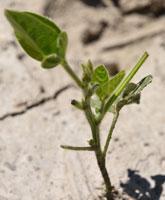Control Through Harvesting/Hunting
Deer Information:
Click on the following links to learn more:
Significant deer damage usually means the area has too many deer. The proper time to take care of this problem is during the fall hunting season before the next growing season. You should be aware that any agricultural field of soybeans, corn, or alfalfa that is smaller than 15 acres and located next to wooded or brushy habitats is just like a food plot to attract deer. In these cases entire fields can be destroyed. Deer present less of a problem in large agricultural fields with most damage being concentrated within 30 feet of field edges. Recent research has shown that deer actually have no effect or actually increase yield for soybeans and winter wheat. Soybeans can withstand a removal of up to two-thirds of their leaves without affecting bean production but are most vulnerable up to 7-weeks old. If damage is occurring concentrating protection efforts during this time will have the most impact.
Landowners should consider the following options for reducing or preventing deer damage to their crops:
(1) obtain a permit from the Kentucky Department of Fish and Wildlife Resources (KDFWR) Conservation Officer or District Wildlife Biologist to harvest antlerless deer;
(2) plant a crop that is less palatable to deer;
(3) erect a temporary or permanent electric fence; or
(4) use a chemical repellent to deter the animals.
A permit from KDFWR may allow you to harvest deer at times other than during the legal hunting season. Another permit may allow you to harvest extra does during the legal hunting season. The most effective, long-term, and practical solution to managing large-scale deer problems is fall hunting. Hunting must focus on removing female deer to have an impact on the population and reducing damage.

Soybean damage
Soybeans can withstand a removal of up to two-thirds of their leaves without affecting bean production but are most vulnerable up to 7-weeks old.
